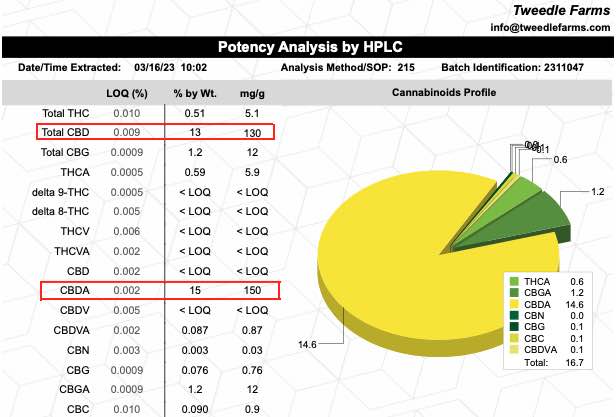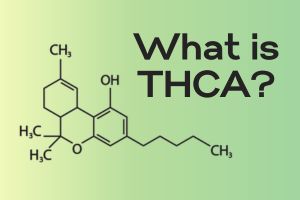What is THCA? Also, what the heck is THCA hemp flower?
Posted by Tweedle Farms on Apr 11th 2023

If you’re reading this, that means you’ve probably spent a little bit of time searching around the internet for CBD hemp flower. In doing so, you’ve likely seen a whole lot of different claims - “hemp flower for pain”; “hemp flower for sleep”; “hemp flower for [enter condition here].” You may have even seen companies claim that it’s possible to grow hemp flower that gets you high!
Now, we’re not talking about the synthetic cannabinoids that were all the rage in ‘21 and ‘22 (think D8, THCO, HHC etc). We’re talking about “THCA hemp flower,” aka THCA flower, high THCA hemp, and so on.
This is a major issue for a few different reasons, but before we dive in, we’d like to make something clear - we do not grow or sell intoxicating hemp flower or hemp products. That was never our intention nor was it what the 2014 and 2018 Farm Bills were intended for. We don’t sell synthetic cannabinoids and we don’t sell cannabis that is high in THCA. We grow and sell high CBD, type lll cannabis, and high CBG, type lV cannabis.
Let’s define THCA. We’ll also offer some clarifications on THCA flower and “THCA hemp flower.”
Before we do, we’d like to take a quick second to touch on the cannabis classification system developed by legendary cannabis scientist, Dr. Ethan Russo, as we’ll be using it to talk about the different kinds of cannabis flower.
- Type l: High THC (or, what’s commonly known as marijuana, weed, etc)
- Type ll: 1:1 ratio of THC:CBD
- Type lll: High CBD (or, what’s commonly known as hemp, hemp flower, cbd hemp flower, etc)
- Type lV: High CBG
The coolest thing about this classification system is that it allows for an infinite amount of future cannabis varieties; high CBDV, high CBC, 1:1 CBD:CBDV and who knows what else!
What is THCA
Tetrahydrocannabinolic acid (THCA) is the primary cannabinoid produced by high-THC, type l cannabis.
Like nearly all cannabinoids in the fresh (ie not dry) cannabis plant, THCA is THC in its raw, acidic form. In this form, it is not psychoactive. That’s why you can juice a fresh bud off a growing cannabis plant or eat a dried, cured, and trimmed bud and not get high at all.
Herein lies the problem - THCA is, by definition, non-psychoactive, but as soon as it is exposed to heat, it converts to THC and becomes psychoactive.
THCA vs THC
THCA vs THC or THC vs THCA; however you write it out, THCA simply decarboxylates (ie converts) into THC when it is exposed to heat. When THCA flower is burned, in a bowl for instance, it converts into THC and gets you high.
Still don’t understand? Let’s use the example of CBDA vs CBD. In our CBD hemp flower, the primary cannabinoid is CBDA. When you smoke our hemp flower, that CBDA decarboxylates at a rate of ~0.877% into CBD.
Check out the lab report from our recent batch Green Goddess below. You’ll notice there are results for CBDA as well as Total CBD. “Total CBD” is the amount of CBD available to you after the CBDA has been converted.

Guess what? The same thing happens with THCA.
That means that the “THCA hemp flower” you just bought online that contains 20% THCA is the same as buying 17.5% THC (because 20 x 0.877 = 17.5) flower from your buddy down the street.
So, what is THCA hemp flower (aka THCA flower)?
Folks, it’s weed. Just weed. Marijuana. Ganja. High THC, type 1 cannabis masquerading as something different.
Here’s the reason why it’s in the hemp flower market.
The 2014 Farm Bill was written poorly by people who know nothing of the ins-and-outs of cannabis. This is the definition of hemp that will be referenced when the legality of THCA flower is questioned:
The plant species Cannabis sativa L. and any part of that plant, including the seeds thereof and all derivatives, extracts, cannabinoids, isomers, acids, salts, and salts of isomers, whether growing or not, with a total delta-9 tetrahydrocannabinol concentration of not more than 0.3 percent on a dry weight basis.
The 2018 Farm Bill set out to close this loophole by implementing updated testing protocols:
Tests shall measure the total THC concentration in a sample submitted to a laboratory for analysis. The laboratory will perform chemical analysis on the sample using post- decarboxylation or other similarly reliable methods where the total THC concentration level considers the potential to convert delta-9-tetrahydrocannabinolic acid (THCA) into THC.
However, the preceding protocol is for pre-harvest tests only. These tests are typically performed around 30 days before the flowers have reached full maturity, and as a result, they’re substantially lower in cannabinoids. These tests, showcasing extremely low concentrations of delta-9 THC are now being used to sell “THCA hemp flower.”
If you ask growers and retailers about the legality of “high THCA hemp flower” though, they’ll likely reference the outdated definition of hemp from the 2014 Farm Bill. They’ll point to a test showing a THCA percentage of 20% AND a total THC percentage of 17.5%, but a delta-9 THC percentage of 0.05%, which therefore makes it “federally legal.”
You can see on our Green Goddess test that was posted earlier that THCA, total THC, and delta-9 THC are listed as three different compounds. They are listed in the same way on tests done on high THC, type l cannabis, and this fact is being used as a justification to brand what is essentially marijuana as “THCA hemp flower,” or simply “THCA flower,” and enter it into a non-psychoactive market.
Here’s another good example: our office is across the street from a dispensary. They have very few, if any, options for CBD flower. They primarily sell high THC, type l cannabis. Now, if we are to follow the logic proposed in the preceding two paragraphs, we could say that our local recreational cannabis/marijuana dispensary, licensed by the state of Oregon to sell THC products, does in fact, sell hemp.
Does that make sense to you? No? Well, it doesn’t really make sense to us either.
Got any more questions of THC, THCA, THCA hemp flower, THCA flower, or any of many iterations of this new fad? Get in touch with us. We’re always happy to help.



